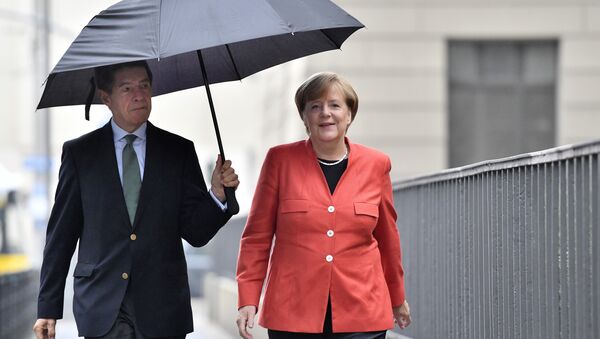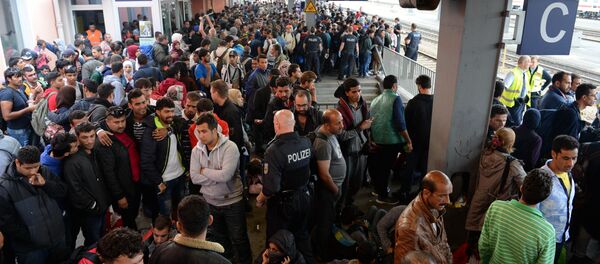MOSCOW (Sputnik) — German Chancellor Angela Merkel confirmed on Monday that her Christian Democratic Union (CDU) and its Bavarian sister party, the Christian Social Union (CSU), had reached an agreement on a cap on refugees arriving in the country, the CDU press service said.
On Sunday, the CDU and the CSU reached a compromise on a maximum number of refugees that the country could accept. The members of the CDU/CSU alliance adopted a package on migration and agreed that the number of migrants should not exceed 200,000 people per year. The CDU leader Merkel and CSU leader Horst Seehofer were present at the negotiations.
"The CDU and CSU achieved common ground and reached a compromise," a message on CDU's official Twitter blog read, citing the German chancellor.
#Merkel: Das Regelwerk ist die Grundlage der Union für die Gespräche mit @fdp und @die_gruenen. Wie viele andere gemeinsame Positionen auch pic.twitter.com/wllYy2IEp3
— CDU Deutschlands (@CDU) 9 октября 2017 г.
The UN Refugee Agency commented on the agreement, saying that it is confident that Berlin will continue its hospitable attitude toward refugees even after Merkel's CDU and its sister party Bavaria's Christian Social Union agreed to limit the annual number of migrants to 200,000 since the deal stipulated exceptions in extraordinary situations, UNHCR's Senior External Relations Officer Chris Melzer told Sputnik on Monday.
"UNHCR is grateful for the German hospitality and the work for refugees and we are sure that this attitude continues. The recent agreement of the two parties is a basis for four party negotiations and UNHCR follows the development. Since the agreement allows exceptions in extraordinary situations, we are sure that Germany stays committed to its international obligations," Melzer said.
Earlier on Monday, German-based prominent refugee protection association Pro Asyl sharply criticized the deal, saying that the 200,000 cap went against the principles of European Convention on Human Rights because of the way it threatened peoples’ right to claim asylum.
Against the backdrop of the large-scale refugee crisis that has affected Europe in recent years, Germany has become one of the most popular destinations for refugees coming to the European Union. In January, the German interior ministry said that about 280,000 refugees came to the country in 2016.
The migrant cap deal has also been criticized by Germany’s Greens party, which is due to become a part of the so-called Jamaica format coalition following the general elections in September. Greens' Co-Chairperson Simone Peter on Monday strongly condemned the move, saying that the party would not "participate in the program of depriving people of civil rights."





